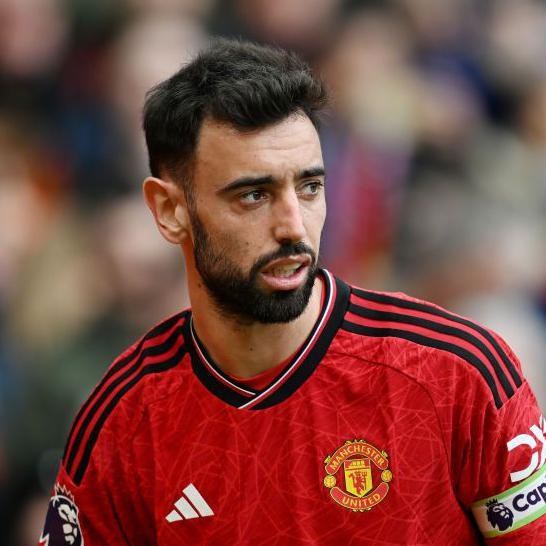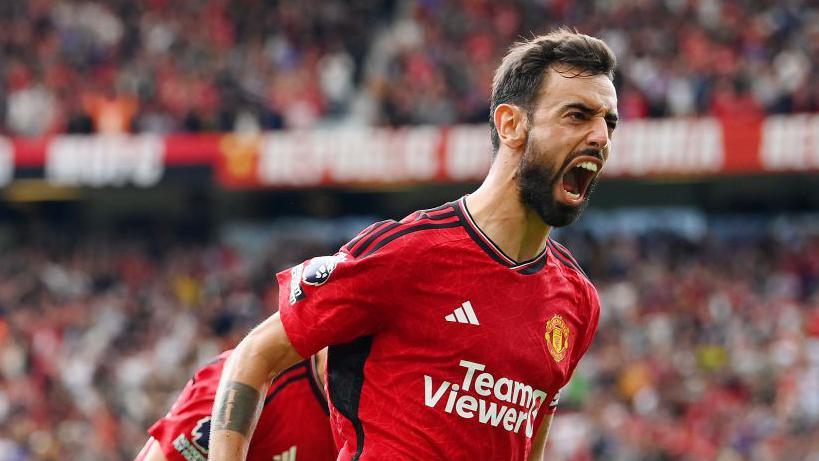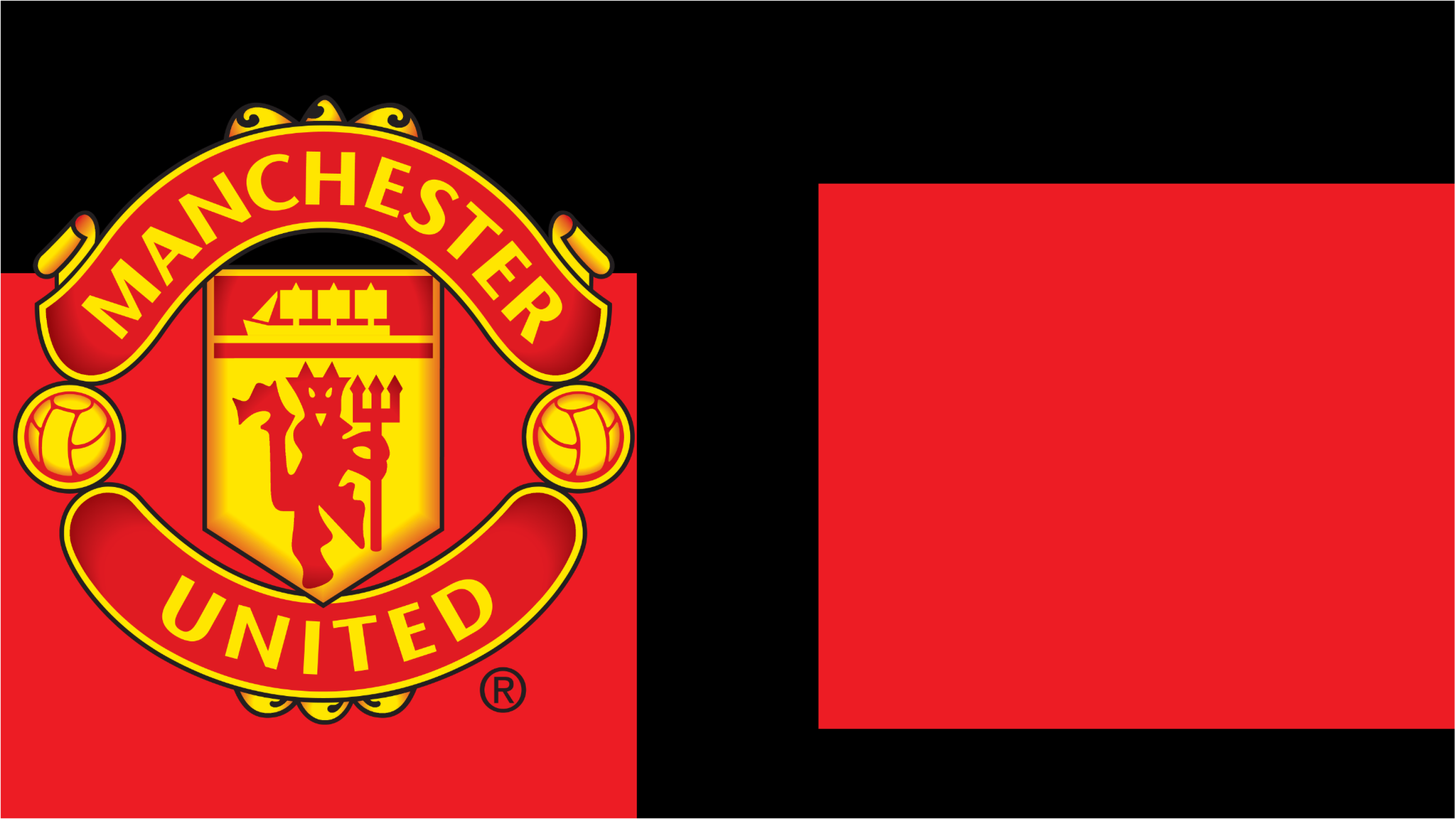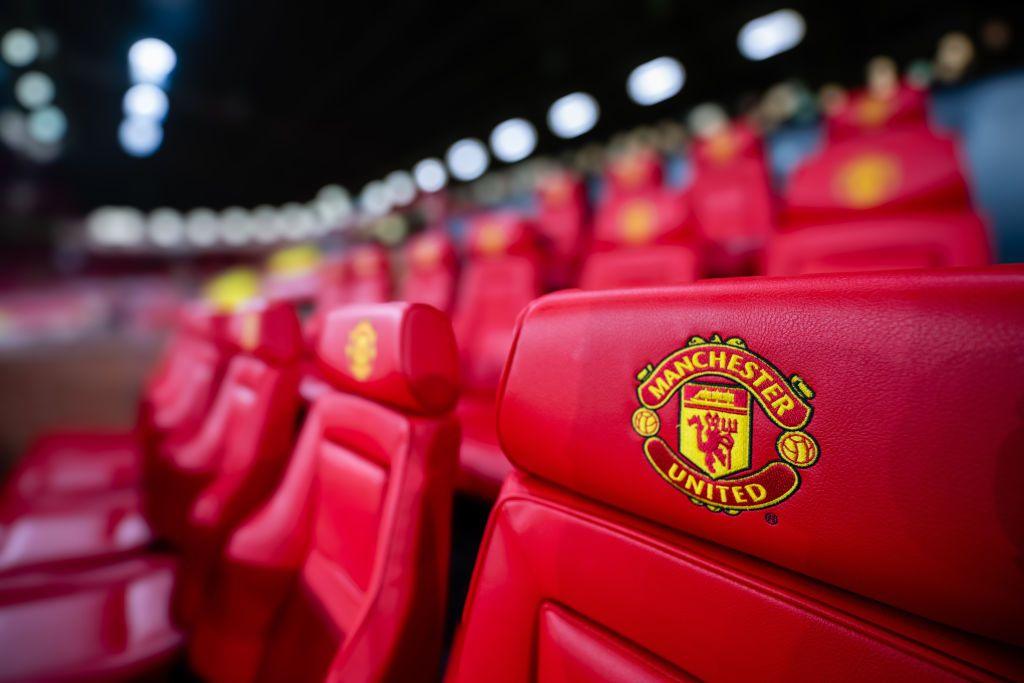'Convinced he was Spurs-bound' - How Fernandes became Man Utd's heart
- Published
- 528 Comments

When Bruno Fernandes leads Manchester United out against Tottenham in Wednesday's Europa League final in Bilbao, both clubs will know things could have been very different.
Six months before the Portuguese midfielder moved to Old Trafford from Sporting in January 2020 for £47m, Fernandes was all set to sign for Spurs under Mauricio Pochettino.
The deal was all but done, after five meetings with his entourage and Spurs left Fernandes and his people impressed with the north London club's structure.
"They were absolutely next level when it comes to detail," said a source involved in the talks.
"Even the rooms at the training ground - each one was decorated just like the players' bedrooms at home, the ones they share with their partners.
"The bed was exactly the same. Even the flowers in the garden gave off a scent that's meant to be beneficial - it was mind-blowing.
"There were two weeks left in the window, but Sporting were going to accept it."
The club board, however, changed their mind, holding out for an offer twice as big that never arrived. With the transfer window closing, they made the decision during the Europa League draw in Monaco to sell Raphinha to Rennes instead.
Fernandes was so convinced that he'd be heading to north London that, when Sporting president Frederico Varandas came to explain the situation, he told him to go away.
For a while, he found himself in a bad place mentally.
Six months later, however, an agreement was reached with Manchester United - and the rest is history.
I'm not a clown - Spurs boss Postecoglou
- Published20 May
The £100m final Man Utd cannot afford to lose?
- Published20 May

Only Pierre-Emerick Aubameyang (34) and Radamel Falcao (30) have scored more goals in the Europa League than United captain Bruno Fernandes (27), while he is top for assists (19) and total goal involvements (46).
'A little genius from a humble family'
It was one of those reality-check moments.
Having trained with the team just once, Fernandes was thrown straight into Manchester United's starting XI for a goalless draw with Wolves at Old Trafford in February 2020.
The former Sporting midfielder recognised several familiar faces from the Portuguese league on the opposite side that day - but something didn't quite click.
"These lads used to play with me in Portugal. It can't be that they're outrunning me now," he said to himself during his debut match.
Struggling to cope with the intensity, he was relieved when the fourth official held up the substitution board with the number eight in the 88th minute.
As he approached the touchline with cramps, he suddenly realised he was no longer wearing his old Sporting number - that was Juan Mata's.
It may have been the only time in his United career that he was actually desperate to come off.
Much has changed since then for the man who recently said: "He can rest when he dies."
Fernandes now carries the captain's armband, is widely regarded as the club's most successful signing of the post-Sir Alex Ferguson era and once again has the number eight on his back - a tribute to his father and hero, Jose Fernandes, who wore it in his playing days.
With 38 goal involvements this season - 19 goals and 19 assists in 54 matches - on Wednesday night, the 30-year-old will be hoping to win his first major international trophy with the team and help salvage a highly frustrating domestic campaign.
He has become the heart and lungs of Ruben Amorim's side.
Not that it comes as a surprise for someone who grew up chasing buses around the Porto area - neither of his parents ever had a driver's licence.
"He was a little genius from a humble family," Abilio Novais, one of his earliest mentors at Boavista, told BBC Sport.
"You could see he wanted to make it so bad. He hated losing - really hated it. He'd sulk for ages. But that fire, that edge… It was obvious. Sooner or later, he had to become a footballer."
The Portuguese maestro did - never losing the hunger that still distinguishes him from others on the pitch.
'A willingness to speak his mind has always been there'
Fernandes' willingness to speak his mind is well known, but it didn't simply arise as he matured. It has always been there.
His parents discovered that while discussing moving the whole family to Switzerland.
In the late 2000s, Portugal was facing its worst recession in generations. Like many others, Bruno's father, Jose, lost his job and had no choice other than to emigrate.
The original idea was never for him to go alone, but to take his wife and three children with him.
Rising through the youth ranks at Boavista back then, Bruno refused to go and threatened to run away if they insisted on the idea.
"In Switzerland, they don't know how to play football," he argued. "I'm at a crucial phase at the club."
Ultimately, he got his way - but that meant spending five years apart from his father.
He describes it as the worst period in his youth as Jose was often in the stands supporting him and all of a sudden wasn't there anymore. If the midfielder is such a compelling leader in the United dressing room, it's largely because of this influence in his life.
"I tell everyone this. When I walk around my hometown, I notice it - no one else really does it. But my dad says hello to everyone," he explained in an interview with his former team-mate Afonso Figueiredo in the podcast Entrelinhas., external
"He greets everyone with a good morning. Most of the time, my mum and I ask him, 'Do you even know that person?', and he'll go, 'No'. So we ask, 'Then why did you say good morning?', and he just says, 'Well, the man walked past, looked at me, so I said good morning'.
"It's that instinct to be warm, to get along with everyone from the start. To try and make whatever space he's in feel positive, feel good - a nice place where people feel comfortable. And I think, in a way, that's where it all comes from for me."
The time Bruno could have joined Boro
A former Porto footballer, his ex-Boavista coach Novais is a cult hero in Portugal.
Having crossed paths with former Portugal and Barcelona midfielder Deco early in his career at Salgueiros, he was crystal clear from the start that Fernandes could follow a similar path and reach the very top, too.
Not because he had an out-of-this-world talent - that was impossible to tell at that point - but because he had the determination to work harder than anyone else.
"He already had something about him," Novais said. "You could see he wanted it so bad.
"He was a kid who genuinely wanted to become a professional. He had classes on Wednesdays at the same time we trained at Boavista, around 4:30pm. So, at about 2:30pm, he'd turn up and train on his own with Petronilho, our goalkeeping coach, who'd give him a one-hour session before he went off to school.
"I'd get there and ask Petronilho, 'So, how did he do?', and he'd go, 'Mister, he runs, he works, he does everything. The boy just wants to train'. He had such a passion for the game."
None of this went unnoticed as Bruno, while playing every position on the pitch except goalkeeper, began to attract interest from abroad.
His elder brother Ricardo emigrated to work as a hospital assistant in England, and Fernandes could have taken the same route in 2012.
He was 17 and had two offers on the table: one from Middlesbrough and another from Novara in Italy.
"There was the possibility of those two teams. But things eventually moved forward with Novara; it was the one that worked out best, with the best conditions. They had an academy where I could sleep, where I had food, and where my mum felt more comfortable with me going," Fernandes revealed.
"In the end, it turned out to be the right choice."
From earning the nickname 'The Maradona of Novara' to making his way to Udinese and then to Sampdoria, Fernandes established himself and fulfilled his dream of bringing his father back home from Switzerland.
Even though he was already captaining Portugal's under-21s side, he still flew under the radar among his compatriots.
It was only when he joined Sporting in the summer of 2017 that he truly made a name for himself.
Suddenly, everyone around was talking about the Alvalade sensation, who had finished the 2018-19 campaign with 33 goals and 18 assists, surpassing Frank Lampard's record with Chelsea to produce the most prolific goalscoring season by a midfielder in Europe.
That was when Europa League rivals Tottenham came calling and on Wednesday they will be hoping they aren't made to regret that 'almost' moment back in 2019.
Related topics
- Published26 July 2022

